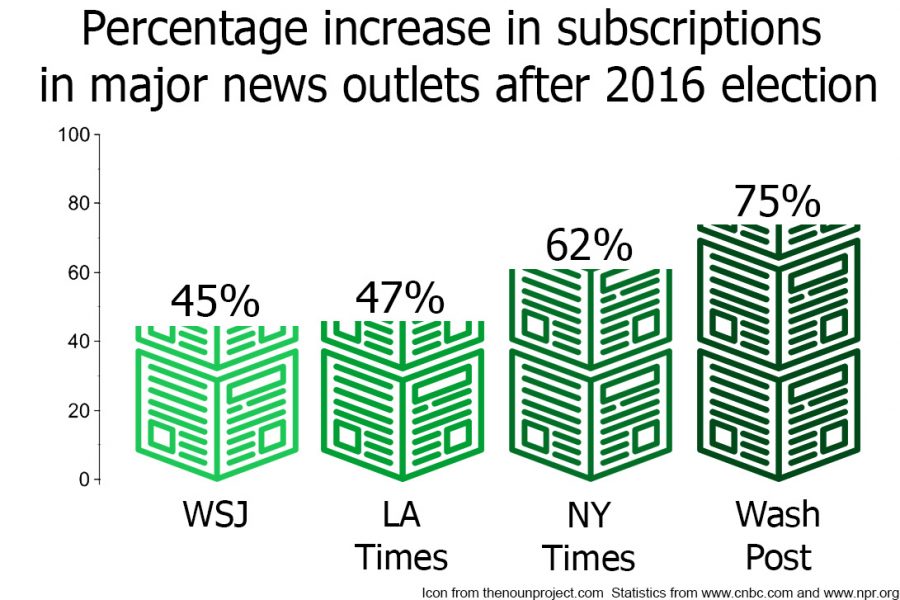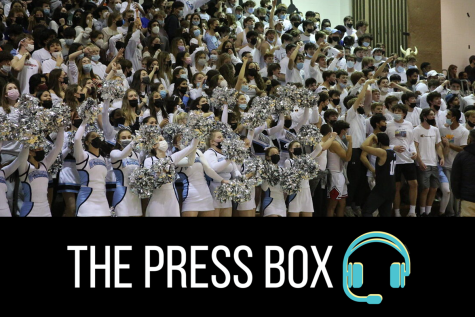Yes, Trump has done something good
September 15, 2017
President Trump launched a war with the media, and he’s made sure we all know it. Americans have become well acquainted with his many Twitter rants and never-ending claims of “fake news”. But not enough people have asked an important question: how is his adversary faring?
The ironic reality is that the harder Trump fights, the more the media benefits. With new scandals breaking seemingly every morning, it’s no wonder that people are picking up the paper more than they did before. In fact, 52 percent of Americans say they’ve paid more attention to politics since Trump’s election, according to the Pew Research Center. This increased awareness has proven a boon for the media industry. The Washington Post’s new subscriptions grew by 75 percent in the past year, more than doubling their former digital subscription revenue, according to NPR. The New York Times, Los Angeles Times and Wall Street Journal all saw record growth in subscriptions as well. Trump’s inflammatory speech—which he often uses to criticize the media—is what’s selling so many of their papers.
This readership growth, which will likely fund more jobs and better equipment, is encouraging for journalists. But Trump’s more important effect is on the heart of the industry. During my summer internship at international news source Voice of America (VOA), a reporter I shadowed told me something I hadn’t contemplated before: Trump has revitalized a once complacent industry. And it turns out this view has support across the trade.
Walter Robinson, who led the Boston Globe’s Spotlight team (and was featured in the Academy-Award winning film of the same name), told Arizona State University students that Trump has “awakened” the media to their role as government watchdog. Instead of passively re-printing what politicians say, journalists are increasingly questioning government figures and delving deeper to find the real truth.
Concerns about the Trump administration—including possible obstruction of justice and Russian collusion—have reignited investigative journalism, which has reached a peak similar to that of Watergate and is still on the rise. The impact of these stories can’t be exaggerated: investigative journalism is the heart of democracy. It exposes corruption and holds public officials accountable. So although some claim that Trump’s crusades damage democracy, his actions may actually be strengthening key aspects of it in the long run.
At the same time, some justifiable concerns about the media’s situation still remain. American trust in the media is at an all-time low; political polarization and disillusionment cause near-constant accusations of media bias. But behind the curtains, major news organizations are working hard to regain the public’s trust.
At VOA, I witnessed firsthand the renewed effort that reporters are putting in to maintain accuracy, balance and fairness. I observed debates over the use of seemingly small and mundane words—what politicians really qualify as “far-right” and does “fend off” seem too defensive? I joined editors, reporters and copy editors in an analysis of the balance of their writing, and I, along with everyone in the newsroom, received e-mails from the director reminding us of the importance of listening to those with whom we disagree. More and more, VOA is reporting politically diverse voices, and that won’t go unnoticed by the people who once felt unheard.
Trust in the media may be low right now, but I have faith that increased awareness and careful adjustment by news organizations will turn that around. For now, we should be grateful for one good thing the Trump presidency has brought: a better media.








alan zhang • Jan 3, 2023 at 9:04 pm
I will never EVER vote for the high tax, woke, socialist democrat party, Trump all the way!!!!!
David Henschel • Dec 27, 2017 at 4:20 am
Yes, public confidence in journalists and commentators is at an all-time low. Accusations of sexual harassment have reduced that confidence even more. Matt Lauer isn’t the only nationally known television commentator who has been accused.
Another is onscreen political commentator Mark Halperin, member of Whitman’s class of 1983. He got straight A’s in the Japanese language class during all three of his years at Whitman. Because of his straight A’s, he won a free trip to Japan with Youth for Understanding.
During Mark Halperin’s trip to Japan in the summer of 1982, I hope he never encountered a Japanese woman who might have told him that sexual aggression is OK. I remember some male students of the Japanese language discussing with glee (at Whitman) stereotypes that were relevant to a geisha, and wondering if every single Japanese female would behave like a geisha if a man encouraged her to do so.
We will never know what sensual memories Mark used to justify his inappropriate behavior in the various television news offices where he worked. An intelligent man who got straight A’s at Whitman and then graduated Harvard, as did Mark Halperin, can think of thousands of justifications for any behavior.
Mark visited the Whitman campus in recent years to give a speech encouraging current students to pursue their dreams. I hope he did not do anything inappropriate during that visit.
Bottom line : millions of Americans distrust all journalists and political commentators. Try forming your opinions of Trump and Pence all by yourself. Ditto for Paul Ryan.